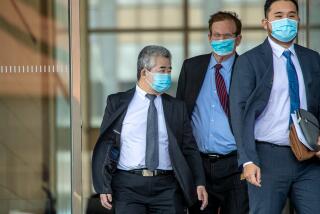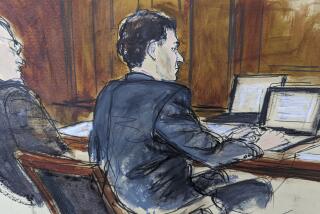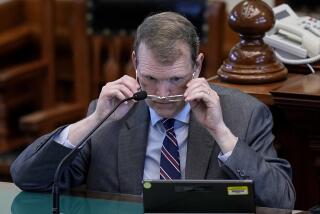Ryan ‘Lived Large,’ Jury Told
- Share via
CHICAGO — Former Illinois Gov. George H. Ryan’s corruption trial got underway Wednesday, with federal prosecutors painting him as an arrogant politician who lived extravagantly and blithely doled out millions of taxpayer dollars to his friends and family.
“George Ryan lived large ... and the money flowed,” Assistant U.S. Atty. Zachary Fardon told the jury during his 90-minute opening statement. “This is a case about betrayal of the public trust.”
Prosecutors have charged that while Ryan served as secretary of state and governor from 1991 until early 2003, he and his relatives accepted tens of thousands of dollars in gifts, cash and other bribes in exchange for state business contracts.
In his opening statement, Ryan attorney Dan Webb told jurors: “This case is not going to be the picture of a corrupt politician who was taking money hand over fist.”
Webb acknowledged that Ryan might have made some mistakes in trusting some of his staff, but “those mistakes are not crimes.”
Ryan, 71, allegedly took free tickets to Chicago Bulls playoff games, lounged at someone else’s expense on the beaches of Jamaica and enjoyed complimentary trips to casinos in Las Vegas with co-defendant Lawrence E. Warner.
Fardon said that Ryan rarely withdrew cash from his personal bank account and never used an ATM, but always traveled “with thick wads of cash” that he would spend wildly on friends and family.
Ryan and Warner face 22 counts, including racketeering conspiracy, mail fraud and other corruption charges. Both men have pleaded not guilty.
Prosecutors have charged that Warner, a 67-year-old businessman and longtime family friend of the former governor, profited the most from Ryan’s alleged wrongdoings. Fardon told jurors that Warner made about $3 million from state leases and contracts in the 1990s.
Among other things, prosecutors said that Warner paid to fix a flooding problem at the apartment of one of Ryan’s children, and paid for the band at Ryan’s daughter’s wedding.
Fardon showed jurors a copy of the check made out to the Dennis Keith Band. The band name is written in Ryan’s handwriting, and the check is signed in Warner’s, the prosecutor said.
Terence Gillespie, Warner’s attorney, told the jury Wednesday that his client was merely a savvy entrepreneur who was “living the American dream” by pursuing business opportunities.
Though the two men were close friends, “that friendship was about many things, but it was never about cash,” Gillespie said.
Webb began his presentation with a list of “evidence and issues the government has ignored.” He said there was no physical proof Ryan received illicit payoffs. Webb also said the government’s key witness -- Scott Fawell, Ryan’s former chief of staff -- was unreliable because he had been intimidated into cooperating with prosecutors.
Fawell, who is serving a 6 1/2 -year prison sentence for corruption and is facing additional federal charges, will testify in exchange for leniency for himself and his fiancee. He is expected to take the stand today.
Also expected to testify for the prosecution is Donald Udstuen, a political ally of Ryan’s who in 2002 pleaded guilty to tax fraud conspiracy. Warner allegedly paid Udstuen a portion of the funds he got from insider real estate deals.
Ryan has said that he will testify on his own behalf.
The former governor, wearing a dark suit and his trademark oversized square glasses, sat silent and grim throughout the day.
He took notes and occasionally glanced toward the packed courtroom at his wife and son.
During a lunch break, Ryan and his family went to the court’s cafeteria, talking quietly at a corner table.
The case is the latest chapter in a lengthy federal investigation of corruption during Ryan’s time as secretary of state and governor, which ultimately led to the end of his political career.
It also has marred the legacy of a man nominated for the Nobel Peace Prize: Before he left office, Ryan shook up the national debate over capital punishment by placing a moratorium on executions in Illinois after learning that several inmates had been wrongly convicted.
The corruption investigation, which initially examined allegations of bribes paid for driver’s licenses, was sparked after an unqualified trucker was involved in an accident that killed six children. Dubbed Operation Safe Road, the investigation has led to 79 indictments and 73 convictions in the last seven years.
Legal experts said that the prosecution had nearly as much at stake in this case as did Ryan and Warner.
“Considering the enormous resources of time, manpower and money that the U.S. attorney general’s office has invested in this case, it’s crucial for them to win,” said Mike Lawrence, director of the Paul Simon Public Policy Institute at Southern Illinois University.
Tracking the alleged money trail, phony companies and illicit deals promises to be a lengthy and laborious task, legal experts said.
The trial is expected to last at least four months. Selecting the 12 jury members and 8 alternates took several days longer than expected.
By the time Ryan’s defense attorney had concluded his opening statements late Wednesday afternoon, at least one of the jurors had briefly nodded off.
More to Read
Sign up for Essential California
The most important California stories and recommendations in your inbox every morning.
You may occasionally receive promotional content from the Los Angeles Times.










